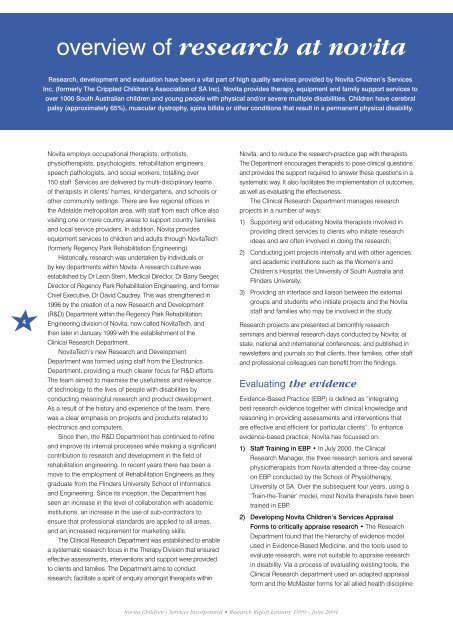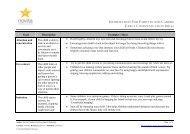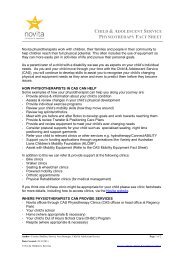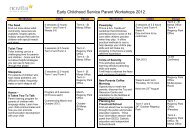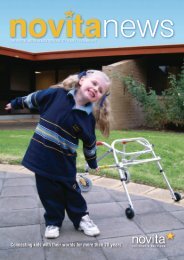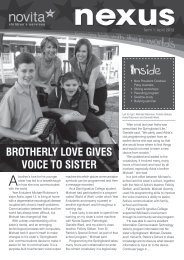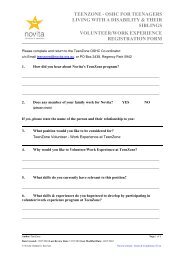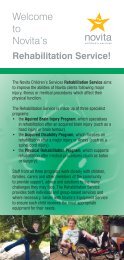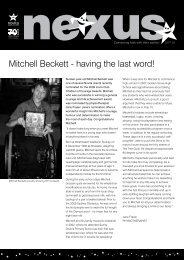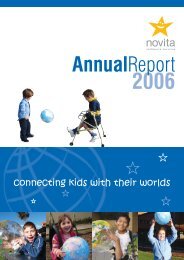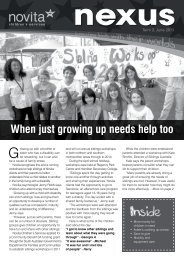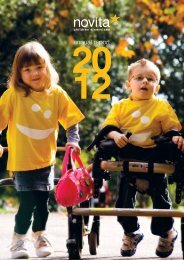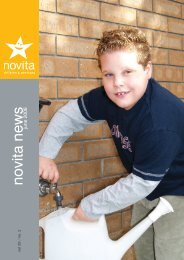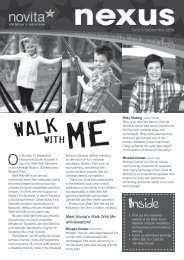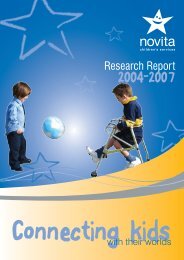Novita Research Report January 1999 - Novita Children's Services
Novita Research Report January 1999 - Novita Children's Services
Novita Research Report January 1999 - Novita Children's Services
You also want an ePaper? Increase the reach of your titles
YUMPU automatically turns print PDFs into web optimized ePapers that Google loves.
overview of research at novita<br />
<strong>Research</strong>, development and evaluation have been a vital part of high quality services provided by <strong>Novita</strong> Children’s <strong>Services</strong><br />
Inc, (formerly The Crippled Children’s Association of SA Inc). <strong>Novita</strong> provides therapy, equipment and family support services to<br />
over 1000 South Australian children and young people with physical and/or severe multiple disabilities. Children have cerebral<br />
palsy (approximately 65%), muscular dystrophy, spina bifida or other conditions that result in a permanent physical disability.<br />
4<br />
<strong>Novita</strong> employs occupational therapists, orthotists,<br />
physiotherapists, psychologists, rehabilitation engineers,<br />
speech pathologists, and social workers, totalling over<br />
150 staff. <strong>Services</strong> are delivered by multi-disciplinary teams<br />
of therapists in clients’ homes, kindergartens, and schools or<br />
other community settings. There are five regional offices in<br />
the Adelaide metropolitan area, with staff from each office also<br />
visiting one or more country areas to support country families<br />
and local service providers. In addition, <strong>Novita</strong> provides<br />
equipment services to children and adults through <strong>Novita</strong>Tech<br />
(formerly Regency Park Rehabilitation Engineering).<br />
Historically, research was undertaken by individuals or<br />
by key departments within <strong>Novita</strong>. A research culture was<br />
established by Dr Leon Stern, Medical Director, Dr Barry Seeger,<br />
Director of Regency Park Rehabilitation Engineering, and former<br />
Chief Executive, Dr David Caudrey. This was strengthened in<br />
1996 by the creation of a new <strong>Research</strong> and Development<br />
(R&D) Department within the Regency Park Rehabilitation<br />
Engineering division of <strong>Novita</strong>, now called <strong>Novita</strong>Tech, and<br />
then later in <strong>January</strong> <strong>1999</strong> with the establishment of the<br />
Clinical <strong>Research</strong> Department.<br />
<strong>Novita</strong>Tech’s new <strong>Research</strong> and Development<br />
Department was formed using staff from the Electronics<br />
Department, providing a much clearer focus for R&D efforts.<br />
The team aimed to maximise the usefulness and relevance<br />
of technology to the lives of people with disabilities by<br />
conducting meaningful research and product development.<br />
As a result of the history and experience of the team, there<br />
was a clear emphasis on projects and products related to<br />
electronics and computers.<br />
Since then, the R&D Department has continued to refine<br />
and improve its internal processes while making a significant<br />
contribution to research and development in the field of<br />
rehabilitation engineering. In recent years there has been a<br />
move to the employment of Rehabilitation Engineers as they<br />
graduate from the Flinders University School of Informatics<br />
and Engineering. Since its inception, the Department has<br />
seen an increase in the level of collaboration with academic<br />
institutions, an increase in the use of sub-contractors to<br />
ensure that professional standards are applied to all areas,<br />
and an increased requirement for marketing skills.<br />
The Clinical <strong>Research</strong> Department was established to enable<br />
a systematic research focus in the Therapy Division that ensured<br />
effective assessments, interventions and support were provided<br />
to clients and families. The Department aims to conduct<br />
research; facilitate a spirit of enquiry amongst therapists within<br />
<strong>Novita</strong>; and to reduce the research-practice gap with therapists.<br />
The Department encourages therapists to pose clinical questions<br />
and provides the support required to answer these questions in a<br />
systematic way. It also facilitates the implementation of outcomes,<br />
as well as evaluating the effectiveness.<br />
The Clinical <strong>Research</strong> Department manages research<br />
projects in a number of ways:<br />
1) Supporting and educating <strong>Novita</strong> therapists involved in<br />
providing direct services to clients who initiate research<br />
ideas and are often involved in doing the research;<br />
2) Conducting joint projects internally and with other agencies<br />
and academic institutions such as the Women’s and<br />
Children’s Hospital, the University of South Australia and<br />
Flinders University;<br />
3) Providing an interface and liaison between the external<br />
groups and students who initiate projects and the <strong>Novita</strong><br />
staff and families who may be involved in the study.<br />
<strong>Research</strong> projects are presented at bimonthly research<br />
seminars and biennial research days conducted by <strong>Novita</strong>; at<br />
state, national and international conferences; and published in<br />
newsletters and journals so that clients, their families, other staff<br />
and professional colleagues can benefit from the findings.<br />
Evaluating the evidence<br />
Evidence-Based Practice (EBP) is defined as “integrating<br />
best research evidence together with clinical knowledge and<br />
reasoning in providing assessments and interventions that<br />
are effective and efficient for particular clients”. To enhance<br />
evidence-based practice, <strong>Novita</strong> has focussed on:<br />
1) Staff Training in EBP • In July 2000, the Clinical<br />
<strong>Research</strong> Manager, the three research seniors and several<br />
physiotherapists from <strong>Novita</strong> attended a three-day course<br />
on EBP conducted by the School of Physiotherapy,<br />
University of SA. Over the subsequent four years, using a<br />
‘Train-the-Trainer’ model, most <strong>Novita</strong> therapists have been<br />
trained in EBP.<br />
2) Developing <strong>Novita</strong> Children’s <strong>Services</strong> Appraisal<br />
Forms to critically appraise research • The <strong>Research</strong><br />
Department found that the hierarchy of evidence model<br />
used in Evidence-Based Medicine, and the tools used to<br />
evaluate research, were not suitable to appraise research<br />
in disability. Via a process of evaluating existing tools, the<br />
Clinical <strong>Research</strong> department used an adapted appraisal<br />
form and the McMaster forms for all allied health discipline<br />
<strong>Novita</strong> Children’s <strong>Services</strong> Incorporated • <strong>Research</strong> <strong>Report</strong> <strong>January</strong> <strong>1999</strong> – June 2004


